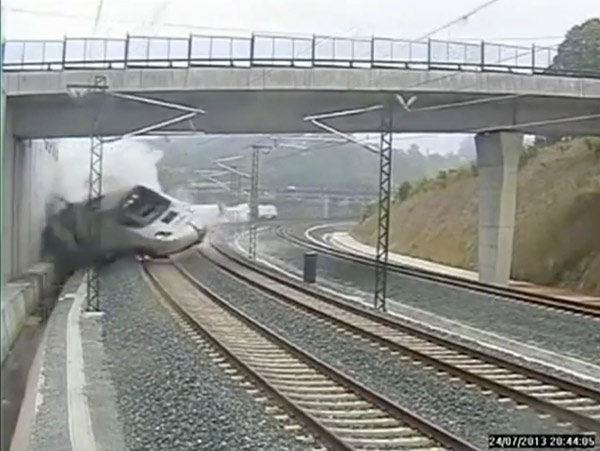Police to question driver for Spanish train crash
SANTIAGO DE COMPOSTELA, Spain - The driver of a Spanish train that derailed, killing at least 80 people, was under police guard in hospital on Friday after the dramatic accident which an official source said was caused by excessive speed.
 |
|
A train derails in this still image from the video of a security camera near Santiago de Compostela, northwestern Spain, July 24, 2013. [Photo/Agencies] |
The eight-carriage train came off the tracks, hit a wall and caught fire just outside the pilgrimage destination Santiago de Compostela in northwestern Spain on Wednesday night. It was one of Europe's worst rail disasters.
The source had knowledge of the official investigation into a crash which brought misery to Santiago on Thursday, the day when it should have celebrated one of Europe's biggest Christian festivals.
With the festivities canceled, hundreds of people went to the site of the wreck instead, where they watched cranes picking the mangled train carriages off the tracks.
"My brother-in-law lives close by and was helping pull out people, dead and alive, all night. He's very shaken. I've come now with some friends just to see how it all ends," said Manuel Garcia, one of the curious onlookers.
A judge in Santiago de Compostela, capital of the northern Spanish region of Galicia, was assigned to investigate the accident. The judge ordered police to question the train's driver, named by local media as 52-year-old Francisco Jose Garzon.
It was not clear what kind of injuries the driver had suffered. He was not arrested, but he was under a police guard at the hospital and the questioning was expected to take place on Friday.
State train company Renfe said the driver was a 30-year veteran of the firm with more than a decade of train driving experience.
Video footage from a security camera showed the train, with 247 people on board, hurtling into a concrete wall at the side of the track as carriages jack-knifed and the engine overturned.
The train entered the bend at 190 km per hour (120 mph), according to local media reports. The speed limit on the curve was 80 km per hour (50 mph).
Investigators were trying to find out why the train was going so fast and why security devices to keep speed within permitted limits had not slowed it down.
The impact was so huge one carriage flew several meters into the air and landed on the other side of a concrete barrier. Bodies were strewn next to the tracks in the aftermath.
Around 94 people were injured, 35 of them, including four children, in a serious condition, the deputy head of the regional government said.
The dead included a US citizen and a Mexican, and at least one British citizen was injured.





















